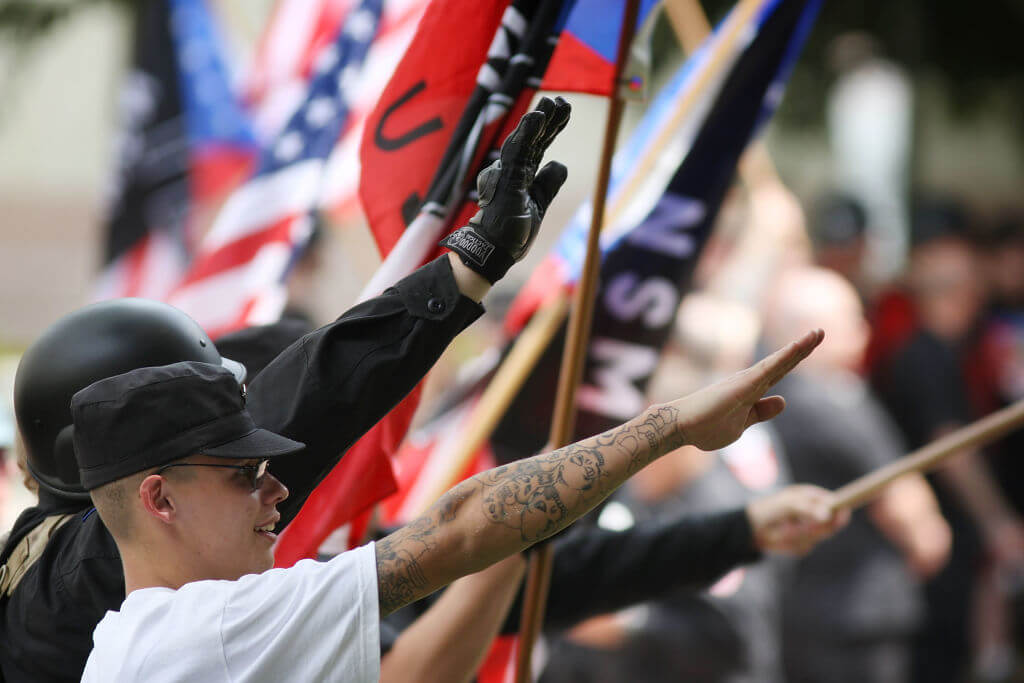Extremist activity ‘more troubling than any time in recent history,’ says SPLC
Antisemitic conspiracy theories driving much of the rise in hateful rhetoric, violence

Members of the National Socialist Movement (NSM) rally near City Hall in Los Angeles in 2010. Photo by David McNew/Getty Images
Extremist hate movements, including those that target Jews, became bolder in their actions in 2022, holding armed protests across the United States and cementing ties with mainstream political parties and institutions, according to a report released Tuesday by the Southern Poverty Law Center.
During a press conference on Tuesday, SPLC president and CEO Margaret Huang called the document an “important barometer of the country’s experience with hate and anti-government extremist activity” that reveals trends that are “more troubling than at any time in recent history.”
Among those trends is how antisemitism plays a uniting role among the far right, “unifying adherents across various extremist ideologies around efforts to subvert and misconstrue the collective suffering of Jewish people in the Holocaust and cast them as conniving opportunists,” wrote the authors.
The annual report on hate and extremism identified over 700 antigovernment groups and more than 520 hate groups. While only nine of those groups were labeled as specifically antisemitic in their ideology, another 121 were listed under “general hate,” 109 as white supremacist, 60 as neo-Nazi and 11 as offshoots of the Ku Klux Klan.
Other hate groups were identified as anti-LGBT, anti-Muslim and neo-Confereate, among others.
California, the country’s most populated state, was also home to the most hate groups with 46, followed by Texas (33), Florida (35), New York (28) and Pennsylvania and Tennessee with 21 each.
While the number of Holocaust denial groups did not grow in 2022, the report noted that antisemitism was visible throughout the year due to high-profile incidents. Those include the armed standoff in a Texas synagogue in January 2022 and disgraced rapper Kanye West’s monthslong spree of media appearances and tweets in which he promised to go “death con 3” against Jewish people, praised Hitler and denied the Holocaust.
The report also noted a surge in activity by the Goyim Defense League, a Florida-based antisemitic group that has been active in disseminating flyers and creating online content.
These incidents helped normalize antisemitism, which often is a “connective tissue between hate groups that might otherwise seem unconnected,”said Susan Cork, director of the SPLC’s Intelligence Project. The report also highlighted how ideas and rhetoric that used to be restricted to the political fringes have made headway into the mainstream, primarily through members of the Republican Party. For instance, nearly 7 out of 10 Republicans said they believe demographic changes in the United States are being driven by progressive groups in an effort to solidify their power base. That notion is tied to the antisemitic replacement theory, which falsely posits that Jews are behind those demographic shifts. Often, that idea is tied specifically to Jewish billionaire philanthropist George Soros, who was the subject of an uptick in mentions on social media in 2022. The theory was cited by the shooter in the May 2022 killing of 10 Black people in Buffalo.
“His name was used as a standard and a persistent antisemitic trope as a stand-in for more explicitly bigoted statements,” said Rachel Carroll Rivas, SPLC deputy director for research, analysis and reporting.
Another major narrative that has become predominant on the far right revolves around ideas that all members of the LGBTQ+ community are a threat to children and families. The report notes that armed protests against drag show venues and Pride parades have become commonplace and driven by groups like the Proud Boys, which have grown from 43 chapters in 2020 to almost 80.
The report included several recommendations for combating hate groups, which included having political and community leaders being vocal in their condemnation, making the collection of hate crime legally required, creating an official position whose mission is to combat extremism in the military and holding social media companies accountable for hateful content.













